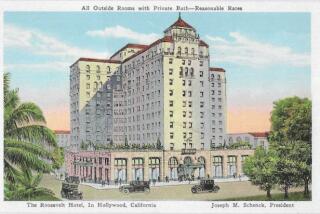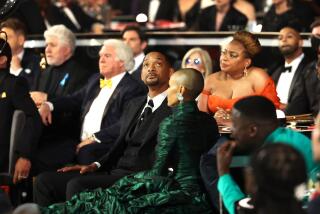Christie’s Gets No Bidders for Colbert’s Oscar
And the Oscar goes to: Nobody.
For the second year in a row, the Academy of Motion Picture Arts and Sciences can thumb its nose at Christie’s after the auction house failed Saturday to sell Claudette Colbert’s 1934 Oscar for the film “It Happened One Night.”
Last year, Christie’s ignored the Academy’s protests and auctioned off Clark Gable’s gold-plated statuette from the same film for $607,500. But the anonymous bidder turned out to be director Steven Spielberg--who donated the award back to the academy.
Spielberg said he wanted to guard Oscar’s prestige from rich treasure hunters who would exploit it for commercial gain. Christie’s opened bids on the Colbert’s Oscar at $80,000 but none of the 100 people at the Beverly Hills auction house raised a bidding paddle. Telephone buyers, who place their bids through Christie’s employees, did not answer the call either.
“I think people were intimidated by the price that Gable’s award went for,” said Nancy Valentino, a Hollywood memorabilia specialist who set the Oscar’s asking price for Christie’s.
Valentino explained that although many could have easily covered the asking price, they abstained from entering what they expected would be a rapid-fire auction, fearing that the stakes would quickly be raised beyond their means.
The Oscar will be returned to Colbert’s estate.
The academy could not be reached for comment. But on Friday, academy officials had voiced their opposition to the auctioning of the statuette.
“We’ve always discouraged the sale of Oscars,” said Leslie Unger, an academy spokeswoman. “It symbolizes the achievement of the actor who won it. None of that achievement gets transferred to a commercial buyer.”
The academy unsuccessfully sought a court order to keep the Gable award off the block and tried to persuade Christie’s not to auction Colbert’s Oscar.
Since 1950, Oscar winners have been subject to a legal clause that says they can only sell their prize back to the academy, at a fee of $10.
The Gable and Colbert statuettes are important because they are part of a shrinking pool of Oscars won before the legal restriction was adopted.
Other Hollywood memorabilia, including photos signed by Spencer Tracy, Rita Hayworth and Alfred Hitchcock, did sell Saturday.
An evening gown donned by Marilyn Monroe in “How to Marry a Millionaire” sold for $57,500 and a red leather chair used by Humphrey Bogart in one of his movies brought in $32,200.
More to Read
The biggest entertainment stories
Get our big stories about Hollywood, film, television, music, arts, culture and more right in your inbox as soon as they publish.
You may occasionally receive promotional content from the Los Angeles Times.










